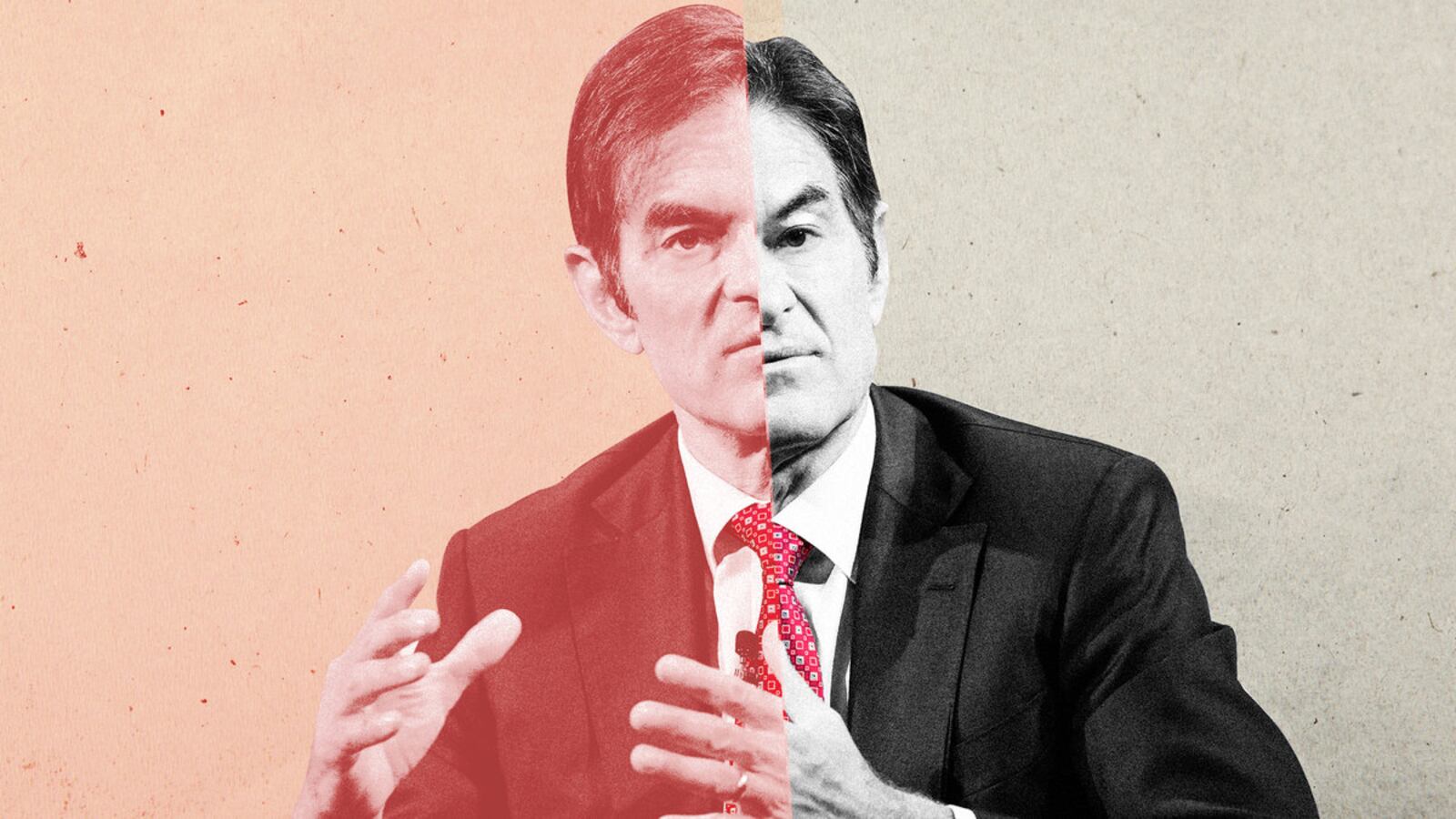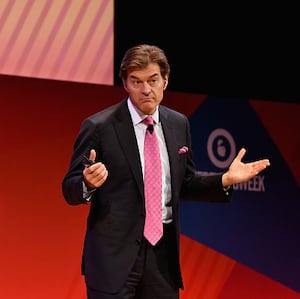When the Supreme Court heard arguments last week for a case that could upend abortion rights nationwide, Mehmet Oz—the TV doctor and accused “quack” turned Republican candidate for Senate in Pennsylvania—suggested he was at peace that the Supreme Court could overturn Roe v. Wade.
But only two years earlier, Oz characterized efforts to overturn Roe as a misleading and possibly conspiratorial crusade. Not only was Oz supportive of abortion rights, he seemed puzzled that people would spend time fighting abortion rights—going so far as to say that, as a physician, he was “really worried” about the anti-abortion movement and that eliminating Roe would have negative effects on women’s health.
“It’s, as a doctor—just putting my doctor hat on—it’s a big-time concern,” Oz said in the 2019 interview, which aired on the Breakfast Club radio show. “Because I went to medical school in Philadelphia, and I saw women who had coat-hanger events. And I mean really traumatic events that happened when they were younger, before Roe v. Wade. And many of them were harmed for life.”
Oz conceded that abortion “is a hard issue for everybody,” and he said that, on “a personal level,” he disliked abortion and would not want anyone in his family to have one. But he took a common pro-choice position in 2019 that his belief should not be forced onto others. He would not want to “interfere with everyone else’s stuff,” he said, “because it’s hard enough to get into life as it is.”
Oz’s defense of abortion wasn’t just a passing question. He held forth for seven minutes in this 2019 interview about the practice and was highly critical of anti-abortion advocates who argue that life begins at conception. His tone throughout the entire segment on abortion was one of concern that legislators might be passing abortion restrictions, and he seemed to endorse viability—generally thought of as about 24 weeks—as a popular limit for abortion.
“Just being logical about it,” he said, “if you think that the moment of conception you’ve got a life, then why would you even wait six weeks? Right, then an in vitro fertilized egg is still a life.”
Oz also questioned why restricting abortion access was so important to some people.
“There’s so much we gotta do already to take care of each other. To start picking fights on this—I always wonder about it,” he said. “It happens periodically. There are these moral issues that almost on purpose are inflamed.”
And yet, despite his full-throated support for abortion access in 2019, Oz said last week during an interview on WGAL in Lancaster that he was “OK with the Supreme Court making the right decision” on Roe, “based on what they think the Constitution says.”
Earlier that day, the high court heard arguments regarding a challenge to Mississippi’s prohibitive abortion law, with conservative justices signaling they were prepared to scrap Roe entirely.
But in the discussion with the Breakfast Club—hosted by rapper and political pundit “Charlamagne tha God”—Oz devoted several minutes to explaining why the resurgent anti-abortion movement concerned him as a physician, and why Roe was valuable and should not be overturned.
When The Daily Beast called Dr. Oz for comment, he picked up his phone and immediately ended the call. He then did not reply to a text message asking about his remarks in the abortion discussion.
But asked in 2019 about prohibitive laws like the near-total ban Alabama Republican Gov. Kay Ivey had signed earlier that month—a so-called “heartbeat” bill which outlawed abortion in almost every instance starting six weeks after conception—Oz denounced the idea as dangerous, unfair to women, and premised on misleading information.
Oz, who would be the first Muslim elected to the Senate, considers himself “100% pro-life” and has incorporated faith-based initiatives into his programming. He questioned why anti-abortion advocates cared so much in the first place.
“Is this really the way they want to spend their time?” he wondered. “There’s so much we gotta fix in the world.”
While the physician and herbal weight-loss supplement salesman acknowledged that true believers “gotta be heard,” he said “that doesn’t mean that’s what the rule of the land is.”
“If people thought about it and logically work through it, most Americans sort of already agree on what the right answer is”—a position that appears directly at odds with the conservative majority on the Court.
Asked by tha God whether he thought prohibitive anti-abortion laws were “healthy,” Oz replied, “I’m really worried about it,” and invoked his professional experience.
“I’ve taken care of a lot of women who had issues around childbirth. The problem with the [Alabama] law as it stands now—and I think the law was really only passed to generate a Supreme Court challenge—but most women don’t know they’re pregnant,” he said, taking specific aim at the bad-faith effort to overturn Roe. “It’s two weeks past your last period when you have to decide by,” Oz explained, referencing the six-week line.
Oz, who rose to fame in the 2000s as a regular guest on Oprah Winfrey’s daytime television show, claimed he had guests on his own show “all the time” who did not know they were pregnant even “when they’re delivering.”
“So you’re asking women to decide almost instantaneously if they’re pregnant or not,” Oz said. “And it’s also banned in cases of incest and rape. So I don’t quite get it as a doctor.”
He then went to lengths to dismantle the spurious six-week “heartbeat” talking point.
“There are electrical exchanges at six weeks, but the heart’s not beating,” Oz said.
“If you’re going to define life by a beating heart, then make it a beating heart, not little electrical exchanges in the cell that no one would hear or think about as a heart,” he continued. To do otherwise, he said, misleads the average person into “envisioning a little acorn heart beating in there, and that’s not what’s going on at six weeks.”
The Mississippi law currently before the court is not as extreme as Alabama’s 2019 bill, banning abortions after 15 weeks, not six. But hours ahead of Oz’s interview, the conservative justices signaled they were open to a broad ruling that would legalize six-week bans.
Chief Justice John Roberts was the lone conservative to raise the question of a narrow decision, saying, “The thing that is at issue before us today is 15 weeks.” But Roberts would need to pick off at least two other conservatives, and none appeared eager to join him.
One of those justices, Samuel Alito, mused that “the only real options we have” are to uphold or overturn Roe.
And while Oz now seems fine with a conservative majority overturning Roe, as he faces a GOP primary field of anti-abortion Republicans, Oz was explicitly concerned by that prospect in 2019, and suggested abortion bans could result in a “big sucking sound of businesses leaving” states.
When Breakfast Club co-host Angela Yee expressed concern that if Roe were overturned, abortions would continue, but “in a dangerous way and it could actually kill you,” Oz backed that up with his own medical experience.
The abortion discussion was only one part of a wide-ranging interview on the Breakfast Club. Dr. Oz and the hosts also covered why it’s unsanitary to wash chicken before cooking it (“you spray the salmonella all over the kitchen”), why Americans should consume less meat (“what’s destroying our economy in many ways is the way we eat so much meat”), the medical promise of hallucinogenic drugs (“I don’t have a problem that I think it would help”), environmentally friendly wet wipe alternatives (“I take toilet paper; I spit on it, to moisten it, or use the sink”) and how liberals and conservatives are different “partly for genetic reasons.”
“Liberals primarily view freedom and the right to do what’s important to them as their primary drivers. Conservatives tend to use other factors in addition. For example, you don’t want people pissing in your neighborhood—that’s much more important to conservatives,” Oz explained.
An acclaimed thoracic surgeon and director of integrated medicine at one of the top med schools in the country, Oz long ago morphed into a controversial public figure straddling the worlds of health, media, and politics. He leveraged Oprah’s imprimatur into a multimillion-dollar celebrity doctor brand, racking up accusations of “quackery” along the way—promoting false theories about genetically modified foods and hawking “sham” weight-loss supplements, for which he at one point answered to Congress.

Dr. Oz watches as Oprah Winfrey shaves off the moustache of television personality Dr. Phil in 2010.
Lucas Jackson/ReutersAs the coronavirus pandemic descended last spring, Oz—a regular on Fox News—caught the attention of then-President Donald Trump, who wanted to connect with Oz after watching him speak positively about the unproven COVID treatment hydroxychloroquine.
In an interview two months before the 2016 election, Oz briefly quizzed then-candidate Trump on women’s reproductive health, touching first on birth control and following up with a fleeting discussion about abortion.
“What is your stand on abortion today?” Oz asked.
“I am pro-life,” Trump replied.
Oz had no other follow-ups.
—CORRECTION at 1:50 p.m., 12/07/2021, to clarify that Dr. Oz is Muslim, not Christian.








